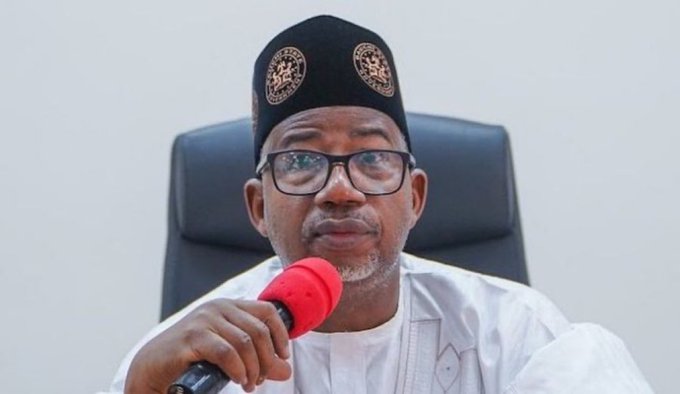Bauchi State Governor, Bala Mohammed, has addressed his absence from a New Year visit to President Bola Tinubu’s Lagos residence, dismissing rumors of political discord as baseless. The governor cited personal reasons, specifically the death of his 102-year-old stepmother, Hauwa Duguri, as the cause of his nonattendance.
This explanation follows public and political scrutiny, fueled by recent tensions between Mohammed and the Presidency over the controversial Tax Reform Bill. Speculations that his absence was a deliberate snub in light of these disagreements had gained traction, prompting a response from the governor’s camp.
A Time of Mourning
Speaking through his Special Adviser on Media and Publicity, Mukhtar Gidado, the governor made it clear that his priority during the New Year period was grieving the loss of a close family member. “The stepmother of the governor, Hauwa Duguri, passed away on Wednesday, the same day as the New Year visit,” Gidado stated. “The governor has been restless. As I speak to you, we are in his country home in Duguri, mourning her loss.”
Gidado criticized those drawing connections between Mohammed’s absence and his political disagreements with President Tinubu, calling such insinuations “uncalled for.” He emphasized that the governor’s personal tragedy should not be politicized.
Political Tensions Unrelated
Governor Mohammed’s absence comes amid heightened tensions surrounding Tinubu’s proposed Tax Reform Bill, a policy initiative that has faced resistance from several quarters, including the opposition Peoples Democratic Party (PDP), to which Mohammed belongs. As the chairman of the PDP Governors’ Forum, Mohammed has been vocal in his criticism of the bill, accusing the Presidency of attempting to stifle dissent through blackmail.
Earlier in the week, the Presidency accused Mohammed of issuing threats against Tinubu, a claim the governor strongly refuted. In a sharp rejoinder, Mohammed alleged that the Presidency was attempting to undermine his credibility for opposing the tax reforms. “I stand with the people of Bauchi and Nigerians at large in resisting policies that threaten our collective economic welfare,” Mohammed reportedly said in response.
Despite these exchanges, Gidado stressed that the governor’s absence was purely coincidental. “It is unfair and misleading to suggest that Governor Mohammed’s absence had anything to do with his principled stance on national issues. He was dealing with a deeply personal matter,” Gidado reiterated.
A Gathering of Governors
The New Year visit, held at President Tinubu’s residence on Bourdillon Road in Ikoyi, Lagos, was attended by several governors across party lines. Among them were Kano State’s Abba Yusuf, Delta State’s Sheriff Oborevwori, Kwara State’s AbdulRahman AbdulRazaq, and Lagos State’s Babajide Sanwo-Olu. Other attendees included Rivers State’s Siminalayi Fubara, Borno State’s Babagana Zulum, and Ondo State’s Lucky Aiyedatiwa, among others.
Mohammed’s absence was conspicuous, given his position as a prominent opposition figure and the leader of the PDP Governors’ Forum. His nonattendance led to whispers about a possible boycott, especially given his recent public disagreements with the Presidency.
However, sources close to the Bauchi governor dismissed such claims, pointing out that Mohammed has always been committed to fostering dialogue and unity across political divides. “The governor understands the importance of maintaining respectful relationships with the Presidency, irrespective of party affiliation,” said a PDP insider who spoke on condition of anonymity.
Broader Implications
The speculation surrounding Mohammed’s absence highlights the fragile nature of political relationships in Nigeria, particularly between the ruling party and opposition leaders. Analysts have pointed out that the governor’s outspoken criticism of Tinubu’s policies makes him a target for political narratives, whether or not they are grounded in fact.
“The optics of politics in Nigeria often overshadow the realities,” said Dr. Adamu Musa, a political analyst based in Abuja. “While it’s clear that Governor Mohammed had legitimate personal reasons for his absence, the timing—against the backdrop of his criticism of the tax reforms—provided fertile ground for speculation.”
Musa added that the incident underscores the need for politicians to navigate sensitive situations with care to avoid unnecessary distractions. “This could have been an opportunity for the governor to demonstrate that political disagreements do not preclude engagement and dialogue,” he noted.
Looking Ahead
As the mourning period concludes, Mohammed is expected to resume his duties and continue advocating for policies he believes serve the best interests of his constituents. His opposition to the Tax Reform Bill is unlikely to waver, with sources close to the governor indicating that he will remain steadfast in his critique of what he has described as “regressive policies.”
Meanwhile, political observers await further developments in the strained relationship between Mohammed and the Presidency. While both parties have exchanged words in recent weeks, there is hope that dialogue and mutual respect will prevail.
For now, Gidado’s statement seeks to close the chapter on the controversy surrounding Mohammed’s absence. “This is a time for reflection and grief, not political bickering,” he said. “We urge all well-meaning Nigerians to respect the governor’s privacy during this difficult period.”
A Personal Loss, A Public Lesson
The story of Governor Bala Mohammed’s absence serves as a reminder of the complexities of public life, where personal grief can easily be overshadowed by political narratives. For the Bauchi governor, however, the message is clear: his absence was a matter of the heart, not a statement of defiance.
Whether this explanation will quell the rumors remains to be seen, but for now, Mohammed appears determined to focus on both his personal responsibilities and his political convictions.

